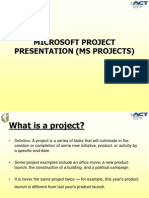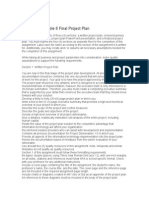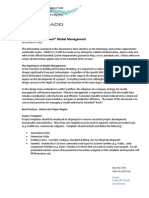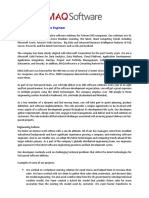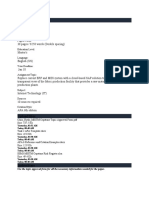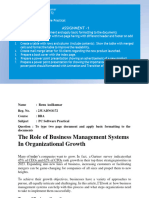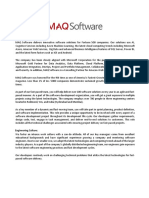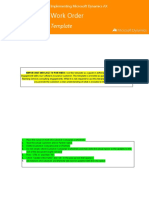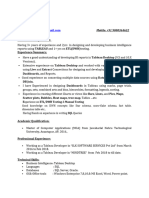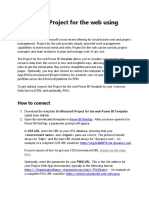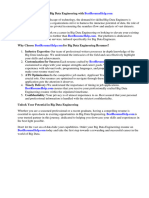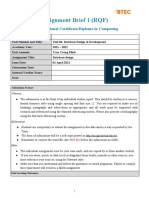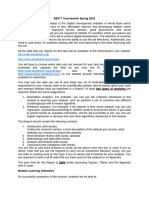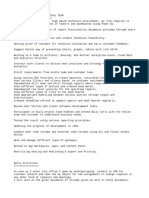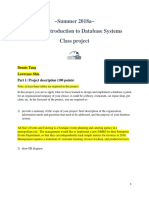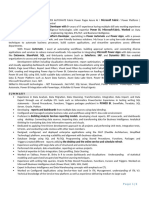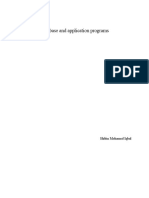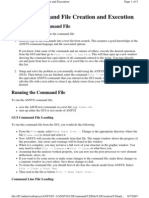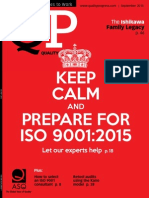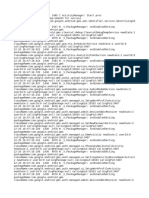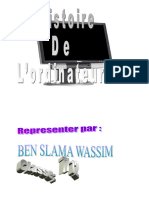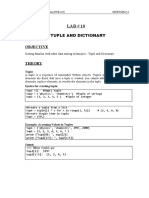0%(1)0% found this document useful (1 vote)
356 viewsDownload: Project Deliverable 3: Database and Data Warehousing Design
Download: Project Deliverable 3: Database and Data Warehousing Design
Uploaded by
Taylor MooreThis document outlines the requirements for Project Deliverable 3, which consists of a database and data warehousing design. It includes two sections - a design document and a revised project plan. The design document must support the need for data warehousing, create a database schema with E-R diagram and DFD, and illustrate data flow. It must be 4-6 pages. The revised project plan uses Microsoft Project to update tasks and sub-tasks from the previous deliverable. Overall, the goal is for the CIO to design a data warehousing solution to leverage a strategic advantage using collected data.
Copyright:
© All Rights Reserved
Available Formats
Download as DOCX, PDF, TXT or read online from Scribd
Download: Project Deliverable 3: Database and Data Warehousing Design
Download: Project Deliverable 3: Database and Data Warehousing Design
Uploaded by
Taylor Moore0%(1)0% found this document useful (1 vote)
356 views2 pagesThis document outlines the requirements for Project Deliverable 3, which consists of a database and data warehousing design. It includes two sections - a design document and a revised project plan. The design document must support the need for data warehousing, create a database schema with E-R diagram and DFD, and illustrate data flow. It must be 4-6 pages. The revised project plan uses Microsoft Project to update tasks and sub-tasks from the previous deliverable. Overall, the goal is for the CIO to design a data warehousing solution to leverage a strategic advantage using collected data.
Original Description:
Project Deliverable 3 Database and Data Warehousing Design
Original Title
Project Deliverable 3 / Database and Data Warehousing Design / Complete Solution / Project file included
Copyright
© © All Rights Reserved
Available Formats
DOCX, PDF, TXT or read online from Scribd
Share this document
Did you find this document useful?
Is this content inappropriate?
This document outlines the requirements for Project Deliverable 3, which consists of a database and data warehousing design. It includes two sections - a design document and a revised project plan. The design document must support the need for data warehousing, create a database schema with E-R diagram and DFD, and illustrate data flow. It must be 4-6 pages. The revised project plan uses Microsoft Project to update tasks and sub-tasks from the previous deliverable. Overall, the goal is for the CIO to design a data warehousing solution to leverage a strategic advantage using collected data.
Copyright:
© All Rights Reserved
Available Formats
Download as DOCX, PDF, TXT or read online from Scribd
Download as docx, pdf, or txt
0%(1)0% found this document useful (1 vote)
356 views2 pagesDownload: Project Deliverable 3: Database and Data Warehousing Design
Download: Project Deliverable 3: Database and Data Warehousing Design
Uploaded by
Taylor MooreThis document outlines the requirements for Project Deliverable 3, which consists of a database and data warehousing design. It includes two sections - a design document and a revised project plan. The design document must support the need for data warehousing, create a database schema with E-R diagram and DFD, and illustrate data flow. It must be 4-6 pages. The revised project plan uses Microsoft Project to update tasks and sub-tasks from the previous deliverable. Overall, the goal is for the CIO to design a data warehousing solution to leverage a strategic advantage using collected data.
Copyright:
© All Rights Reserved
Available Formats
Download as DOCX, PDF, TXT or read online from Scribd
Download as docx, pdf, or txt
You are on page 1of 2
Project Deliverable 3: Database and Data Warehousing Design
(Complete solution project file included)
Download
This assignment consists of two (2) sections: a design document and a revised project plan. You
must submit both sections as separate files for the completion of this assignment. Label each file
name according to the section of the assignment it is written for. Additionally, you may create
and / or assume all necessary assumptions needed for the completion of this assignment.
One of the main functions of any business is to be able to use data to leverage a strategic
competitive advantage. This feat hinges upon a companys ability to transform data into quality
information. The use of relational databases is a necessity for contemporary organizations;
however, data warehousing has become a strategic priority due to the enormous amounts of data
that must be analyzed along with the varying sources from which data comes. Since you are now
the CIO of a data-collection company which gathers data by using Web analytics and operational
systems, you must design a solution overview that incorporates data warehousing. The executive
team needs to be clear about what data warehousing can provide the company.
Section 1: Design Document 1.Write a four to six (4-6) page design document in which you:
Support the need for data warehousing within your company and elaborate on the best practices
that the company will adhere to.
Create a schema that supports the companys business and processes. Explain and support the
database schema with relevant arguments that support the rationale for the structure. Note: The
minimum requirement for the schema should entail the tables, fields, relationships, views, and
indexes.
Create an Entity-Relationship (E-R) Diagram relating the tables of your database schema
through the use of graphical tools in Microsoft Visio or an open source alternative such as Dia.
Note: The graphically depicted solution is not included in the required page length but must be
included in the design document appendix. Explain your rationale behind the design of your E-R
Diagram.
Create a Data Flow Diagram (DFD) relating the tables of your database schema through the use
of graphical tools in Microsoft Visio or an open source alternative such as Dia. Note: The
graphically depicted solution is not included in the required page length but must be included in
the design document appendix.
Illustrate the flow of data including both inputs and outputs for the use of a data warehouse. The
diagram must map data between source systems, data warehouses and specified data marts. The
diagram should map data between source systems, data warehouses, and specified data marts.
Note: The graphically depicted solution is not included in the required page length.
Your assignment must follow these formatting requirements: Be typed, double spaced, using
Times New Roman font (size 12), with one-inch margins on all sides; citations and references
must follow APA or school-specific format. Check with your professor for any additional
instructions.
Include a cover page containing the title of the assignment, the students name, the professors
name, the course title, and the date. The cover page and the reference page are not included in
the required assignment page length.
Include charts or diagrams created in MS Visio or Dia as an appendix of the design document.
All references to these diagrams must be included in the body of the design document.
Section 2: Revised Project Plan
Use Microsoft Project to: 2.Update the project plan from Project Deliverable 2: Business
Requirements, with three to five (3-5) new project tasks each consisting of five to ten (5-10) sub-
tasks.
The specific course learning outcomes associated with this assignment are: Summarize how
information systems represent a key source of competitive advantage for organizations.
Develop information systems-related activities to maximize the business value within and
outside the organization.
Use technology and information resources to research issues in information systems.
Write clearly and concisely about strategic issues and practices in the information systems
domain using proper writing mechanics and technical style conventions.
You might also like
- MS Project PresentationDocument14 pagesMS Project Presentationin_goodguyNo ratings yet
- Kubota v3800 CR Te4 DMDocument349 pagesKubota v3800 CR Te4 DMHubert Chavez100% (10)
- Mounika Reddy 596709889Document4 pagesMounika Reddy 596709889tradersbasketNo ratings yet
- Sys Ana Mini Projt1 Fall2022docx 252743Document4 pagesSys Ana Mini Projt1 Fall2022docx 252743ram jiNo ratings yet
- Logical Data Modeling GuideDocument13 pagesLogical Data Modeling GuideBoyapally Ravikanth ReddyNo ratings yet
- Strayer Cis 499 Project Deliverable 1: Project Plan InceptionDocument8 pagesStrayer Cis 499 Project Deliverable 1: Project Plan Inceptionkingofdeal0% (1)
- Project Deliverable 5 / Infrastructure and Security / Complete Solution / Project File IncludedDocument2 pagesProject Deliverable 5 / Infrastructure and Security / Complete Solution / Project File IncludedTaylor MooreNo ratings yet
- Cis 515Document2 pagesCis 515Daniel LawrenceNo ratings yet
- Itmd 523 Final Project SP 19Document3 pagesItmd 523 Final Project SP 19Sneja shahNo ratings yet
- Business Requirements DocumentDocument2 pagesBusiness Requirements DocumentRoman -No ratings yet
- Assignment - Database Design and DevelopmentDocument7 pagesAssignment - Database Design and DevelopmentUsman Awan100% (1)
- Cis 590 Project Deliverable 6 Final Project Plan 51Document33 pagesCis 590 Project Deliverable 6 Final Project Plan 51tswag2014No ratings yet
- Best Practices For Revit Model ManagementDocument6 pagesBest Practices For Revit Model ManagementyannaingboNo ratings yet
- Ad Design WorksheetDocument28 pagesAd Design WorksheetShradha BogaNo ratings yet
- Project Deliverable 6 / Final Project Plan / Complete Solution / Project File and PPT IncludedDocument3 pagesProject Deliverable 6 / Final Project Plan / Complete Solution / Project File and PPT IncludedTaylor MooreNo ratings yet
- Multidimensional AnalysisDocument6 pagesMultidimensional AnalysisR SreenuNo ratings yet
- Extending The Power BI Template For Project For The WebDocument7 pagesExtending The Power BI Template For Project For The WebMahmoud Karam100% (1)
- 38546Document8 pages38546Arvind MehraNo ratings yet
- Open Position: Software Engineer: Engineering CultureDocument3 pagesOpen Position: Software Engineer: Engineering CultureeshasreeNo ratings yet
- Prasad Reddy19 - Power BI 4.2yrDocument4 pagesPrasad Reddy19 - Power BI 4.2yrRamana ReddyNo ratings yet
- MAQ Software - Job Description - Software Engineer - SE1Document3 pagesMAQ Software - Job Description - Software Engineer - SE118-410 K.CharanNo ratings yet
- Srinuvasulu ResumeDocument4 pagesSrinuvasulu Resumeparitalagopi7788No ratings yet
- Dax PDFDocument64 pagesDax PDFpiyushNo ratings yet
- Summary InstructionsDocument4 pagesSummary InstructionsJakolosai BrianNo ratings yet
- Renu Anilkumar Assignment1Document28 pagesRenu Anilkumar Assignment1arenu557No ratings yet
- Microsoft Dynamics AX 2012 Data Upgrade Best PracticesDocument19 pagesMicrosoft Dynamics AX 2012 Data Upgrade Best PracticesnanduNo ratings yet
- MAQ Software - Job Description - Software InternDocument3 pagesMAQ Software - Job Description - Software InternZaqwNo ratings yet
- New ResumeDocument4 pagesNew Resumevamshisep15No ratings yet
- 09 - Implementing Microsoft Dynamics AX - Engagement SOW FinalDocument15 pages09 - Implementing Microsoft Dynamics AX - Engagement SOW Finalnaveenkumar7754918No ratings yet
- Group Project ReadingDocument6 pagesGroup Project ReadingKhang HuynhNo ratings yet
- DataMigration AX2012Document29 pagesDataMigration AX2012koggenNo ratings yet
- CW COMP1556 28 Ver1 1617Document6 pagesCW COMP1556 28 Ver1 1617dharshinishuryaNo ratings yet
- Structured Systems Analysis and Design: Research ProjectDocument6 pagesStructured Systems Analysis and Design: Research Projectwleonj79No ratings yet
- Data Modeler ResumeDocument5 pagesData Modeler Resumeadnanbashir2187No ratings yet
- Jayaram Resume1Document3 pagesJayaram Resume1rexmonk14No ratings yet
- Connect To Project For The Web Using Power BIDocument5 pagesConnect To Project For The Web Using Power BIMahmoud KaramNo ratings yet
- Ax2012 Enus Deviv 03 PDFDocument64 pagesAx2012 Enus Deviv 03 PDFBachtiar YanuariNo ratings yet
- Big Data Engineer ResumeDocument6 pagesBig Data Engineer Resumebdg8b37x100% (2)
- 1 - 04-DDD - Assignment 1 BriefDocument3 pages1 - 04-DDD - Assignment 1 BriefGuys GoodNo ratings yet
- BIM Model Management PDFDocument6 pagesBIM Model Management PDFpyaephyozawNo ratings yet
- BE277 Coursework 2022Document5 pagesBE277 Coursework 2022baser.namit18No ratings yet
- University of Santo TomasDocument14 pagesUniversity of Santo TomasErwin GoNo ratings yet
- Powerbi Interview ExplanationDocument2 pagesPowerbi Interview Explanationshreyatha reddyNo ratings yet
- Shin Tang Finalproject CoversheetDocument3 pagesShin Tang Finalproject Coversheetapi-398625007No ratings yet
- Project WorkDocument11 pagesProject WorkKatherine PierceNo ratings yet
- Assignment 2Document7 pagesAssignment 2Seema RaniNo ratings yet
- Data Warehouse Augmentation, Part 1 - Big Data and Data Warehouse AugmentationDocument7 pagesData Warehouse Augmentation, Part 1 - Big Data and Data Warehouse Augmentationmukhopadhyay00No ratings yet
- Power_Apps_Developer_GaneshDocument5 pagesPower_Apps_Developer_Ganeshtarun.usctakNo ratings yet
- Power_Apps_Developer_Ganesh (1)Document5 pagesPower_Apps_Developer_Ganesh (1)tarun.usctakNo ratings yet
- CS614 Final Term Solved Subjectives With Referencesby MoaazDocument27 pagesCS614 Final Term Solved Subjectives With Referencesby MoaazchiNo ratings yet
- 04 - Solution Fit Gap Delivery Guide - Implementing AXDocument30 pages04 - Solution Fit Gap Delivery Guide - Implementing AXdbedada100% (2)
- What Is Microsoft Dataverse? - Power Apps - MicroDocument6 pagesWhat Is Microsoft Dataverse? - Power Apps - Micro////No ratings yet
- Guide - Data Science 2.0 Capstone ProjectDocument37 pagesGuide - Data Science 2.0 Capstone ProjectnirupamgangurdeNo ratings yet
- New Dimensions For Reporting: Applies ToDocument13 pagesNew Dimensions For Reporting: Applies ToZaynab FadlallahNo ratings yet
- Dissertation Topics in Data WarehousingDocument5 pagesDissertation Topics in Data WarehousingWriteMyPsychologyPaperUK100% (1)
- Databases and Applications ProgramsDocument7 pagesDatabases and Applications ProgramsShibinMohammedIqbalNo ratings yet
- Data Modeling with Tableau: A practical guide to building data models using Tableau Prep and Tableau DesktopFrom EverandData Modeling with Tableau: A practical guide to building data models using Tableau Prep and Tableau DesktopNo ratings yet
- Microsoft Dynamics NAV Administration: A quick guide to install, configure, deploy, and administer Dynamics NAV with easeFrom EverandMicrosoft Dynamics NAV Administration: A quick guide to install, configure, deploy, and administer Dynamics NAV with easeNo ratings yet
- How To Develop A Performance Reporting Tool with MS Excel and MS SharePointFrom EverandHow To Develop A Performance Reporting Tool with MS Excel and MS SharePointNo ratings yet
- Gen 3Document148 pagesGen 3Sitota tesfayeNo ratings yet
- ANSYS Command File Creation and ExecutionDocument1 pageANSYS Command File Creation and Executionapi-3833671No ratings yet
- Ict101 Evolution of MediaDocument10 pagesIct101 Evolution of MediaVENS RIC VIOS UNDAGNo ratings yet
- FCR-MX Carburetor Dimensions: Float HeightDocument2 pagesFCR-MX Carburetor Dimensions: Float HeightCiprian BeresNo ratings yet
- RWKLDocument2 pagesRWKLgroovey9040No ratings yet
- Cloud StorageDocument9 pagesCloud StorageRithika DundigallaNo ratings yet
- Self Organising Networks (SON) : Phaniteja K RNO HuaweiDocument8 pagesSelf Organising Networks (SON) : Phaniteja K RNO HuaweiKondapalli Phani TejaNo ratings yet
- Unsolved MCQsDocument2 pagesUnsolved MCQsRomi AwanNo ratings yet
- Full IssueDocument76 pagesFull IssueAbdelmutalab Ibrahim Abdelrasul81% (16)
- Revised Final Exam Schedule-9Document4 pagesRevised Final Exam Schedule-9Tesfa HunderaNo ratings yet
- DHCP Spoofing and StarvationDocument8 pagesDHCP Spoofing and StarvationKing DeedNo ratings yet
- Lec 09 Fundamental Cloud Security 1 F23 01012024 020300pmDocument9 pagesLec 09 Fundamental Cloud Security 1 F23 01012024 020300pmNaeem RehmanNo ratings yet
- Communication (Microwave Tower Schematics)Document227 pagesCommunication (Microwave Tower Schematics)Leo Carlo AguilarNo ratings yet
- 2021 SDP PITCH DECK 101-V14-Talktracknotes - 1641590417937Document15 pages2021 SDP PITCH DECK 101-V14-Talktracknotes - 1641590417937Johny GutierrezNo ratings yet
- Exhaust Design by University of Maine FSAEDocument7 pagesExhaust Design by University of Maine FSAEMichael Matthews0% (1)
- MGIS 301 Spring 2010: Microsoft Access Group HomeworkDocument3 pagesMGIS 301 Spring 2010: Microsoft Access Group HomeworkbannuNo ratings yet
- RFID Architecture - Renault Project X62: Simatic S7Document6 pagesRFID Architecture - Renault Project X62: Simatic S7EduardoNo ratings yet
- Optical Spectrum Analyzer AP204XB - APEX TechnologiesDocument4 pagesOptical Spectrum Analyzer AP204XB - APEX TechnologiesAPEX TechnologiesNo ratings yet
- LogDocument49 pagesLogAkhmad kelfin SaputraNo ratings yet
- Diesel Common RailDocument58 pagesDiesel Common Railjose100% (5)
- Service Manual (Machine Code: C235)Document327 pagesService Manual (Machine Code: C235)Bilal BhattiNo ratings yet
- Wa0018.Document4,101 pagesWa0018.Ria SharmaNo ratings yet
- 533 D 30 D 7 B 7 F 69Document18 pages533 D 30 D 7 B 7 F 69zoedivine03No ratings yet
- Swe-102 Lab 10!Document4 pagesSwe-102 Lab 10!Kaif malik100% (1)
- MRF 1946Document1 pageMRF 1946eleazarNo ratings yet
- 01 - SCSC314 Robot StäubliDocument36 pages01 - SCSC314 Robot StäubliSam eagle goodNo ratings yet
- PFM75 Portable Fluid MonitorDocument4 pagesPFM75 Portable Fluid MonitorRizkyNo ratings yet
- Anu Kharwal: Profile SummaryDocument2 pagesAnu Kharwal: Profile SummarySukanta JanaNo ratings yet
